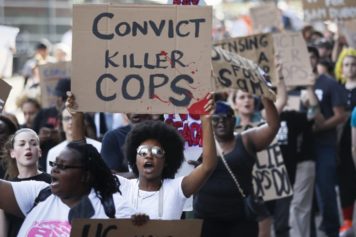
Terina Allen, sister of Samuel DuBose, center right, is hugged by a supporter after Hamilton County Prosecutor Joseph Deters announced during a news conference his decision to not pursue a third trial of former University of Cincinnati police officer Ray Tensing for murder,(AP Photo/John Minchillo)
CINCINNATI (AP) — A white university police officer who fatally shot an unarmed Black motorist during a traffic stop won’t face a third murder trial, a prosecutor announced Tuesday while saying he’s asking federal authorities to consider possible civil rights charges.
Hamilton County prosecutor Joe Deters said he was dropping the case against Ray Tensing on the eve of the two-year anniversary of the death of Sam DuBose. Two previous juries couldn’t reach a unanimous agreement on murder and voluntary manslaughter charges against the former University of Cincinnati officer.
Deters said he concluded he wouldn’t be able to get a jury to convict Tensing and he feels “badly.”
“I’ve got to do what I think is right,” he said.
Tensing’s attorney, Stewart Mathews, said Deters made the right decision because jurors he talked to after the second trial said they felt there would “never be a unanimous decision” reached in the case.
“The system worked exactly as it’s designed to work,” Mathews said. “We tried it with two separate juries, and neither one could come to a unanimous decision, and that’s our justice system working.”
Deters agreed with Mathews that the U.S. justice system is “the best system in the world” but added: “It’s imperfect.” He referred to outrage among some people over football star O.J. Simpson’s 1995 acquittal in Los Angeles on murder charges.
“The division in this country is profound,” Deters said. “I mean, look at the O.J. Simpson case; people were like, ‘What? Not guilty?’ OK? This goes both ways, hard.”
Simpson is up for parole Thursday in Nevada after his 2008 conviction there on armed robbery and other charges.
Tensing shot DuBose in the head after pulling him over for a missing front license plate on July 19, 2015. The officer, since fired from his job, testified he feared he was going to be killed. The shooting is among numerous cases across the nation that have called attention to how police deal with Black people. It also highlighted the challenges prosecutors face in getting jurors to convict police officers for shooting when they say they’re under threat.
Tensing, 27, testified in his own defense at both trials and said he feared he could be dragged or run over as DuBose, 43, tried to drive away.
“I meant to stop the threat,” he told jurors in his second trial. “I didn’t shoot to kill him. I didn’t shoot to wound him. I shot to stop his actions.”
DuBose’s family and civil rights groups wanted a third trial. DuBose’s family earlier called for a federal investigation and wasn’t satisfied by Deters’ announcement the case will be reviewed.
“We are telling the federal government that we believe Tensing violated Sam’s civil rights, his right to life,” DuBose’s sister Terina Allen said. “Tensing has never demonstrated any reasonable or justifiable cause to put a bullet in Sam’s head on July 19.”
U.S. Attorney Benjamin Glassman said authorities will review evidence from the state court trials to assess whether there are possible federal civil rights offenses that might warrant prosecution.
Deters said Glassman’s office contacted his office after the second hung jury. He said case information has been turned over to the federal authorities.
“I’m hopeful that the U.S. attorney’s office will see fit to proceed in this matter,” Deters said.
Federal authorities recently announced they had ended an investigation without charges in a 2014 police shooting of a Black man in a Walmart store in Beavercreek.
DuBose had significant amounts of marijuana and cash on him, and Mathews contends he was desperate to get away from police because he knew he would be headed to jail.
An expert hired by prosecutors said his frame-by-frame analysis of Tensing’s body camera video showed Tensing was not being dragged by the car.
To convict Tensing of murder, jurors had to find he purposely killed DuBose. The charge carries a possible sentence of 15 years to life in prison.
The voluntary manslaughter charge means killing during sudden passion or a fit of rage. That carries a possible sentence of three to 11 years with conviction.
The university reached a $5.3 million settlement with DuBose’s family, including free undergraduate tuition for his 13 children.


